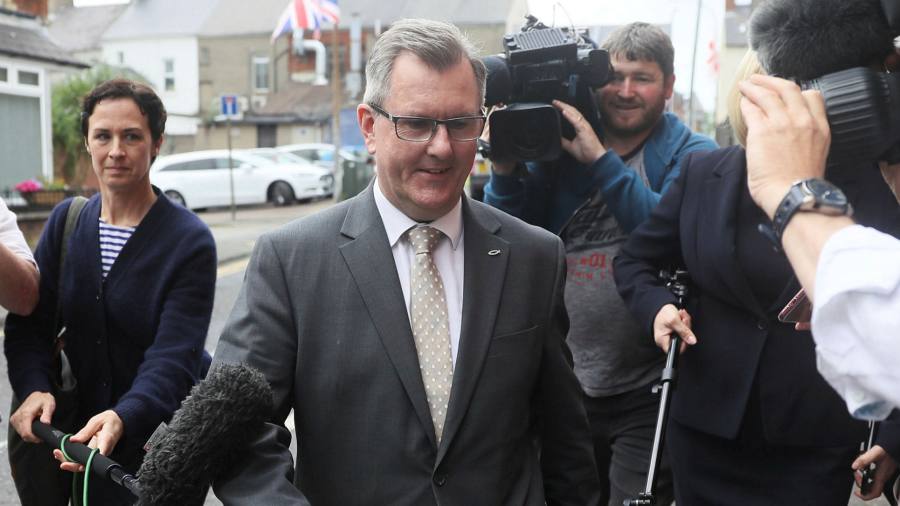Northern Ireland’s Democratic Unionist party is likely to choose Westminster MP Sir Jeffrey Donaldson as its next leader within a fortnight, as the DUP tries to draw a line under a crisis that has destabilised the region’s government.
Donaldson narrowly lost out to Edwin Poots in a May contest to select a successor to incumbent Arlene Foster, who was ousted amid political and social tensions in Northern Ireland unleashed by Brexit.
Poots himself dramatically quit as DUP leader on Thursday after infuriating many in his party by agreeing concessions to nationalist Sinn Féin aimed at keeping Northern Ireland’s power-sharing government intact.
The DUP is the largest party in the Stormont assembly, with the right to nominate Northern Ireland’s first minister.
Lord Nigel Dodds, former deputy leader of the DUP, said Donaldson was “by far and away the best candidate and the favourite” to be the party’s next leader.
Jim Wells, a member of the Stormont assembly who lost the DUP whip under Foster, said the party leadership was Donaldson’s “to turn down”.
Donaldson, who represents a more moderate form of unionism than Poots, did not respond to requests for comment.
The process for appointing the DUP’s next leader is likely to begin over the weekend, said Dodds and Wells. A deadline for nominations could be in a week or two.
The new leader will immediately face the fraught decision of whether to continue with Northern Ireland’s government under terms agreed by Poots, Sinn Féin and UK ministers this week.
Poots angered DUP MPs and its members at Stormont by striking a deal under which Westminster will pass legislation to protect and promote the status of the Irish language.
Sinn Féin had stated that it would only continue in government with the DUP if the legislation was quickly approved by the Northern Ireland assembly.
The DUP refused to agree, but the deadlock was broken when the UK government indicated it would pass the legislation at Westminster.
Asked whether power-sharing could collapse over the Irish language issue, Dodds said Sinn Féin and the British government had a “very grave” responsibility to recognise that any measure should go through Stormont.
He also said the legislation should not be fast-tracked above other measures that were agreed by Northern Ireland’s political parties when the region’s government was restored last year.
Wells said a collapse of the government “could happen because . . . we cannot allow Sinn Féin to run to Westminster . . . every time there’s an impasse”.
The new DUP leader must also decide whether to support Paul Givan, Foster’s successor as Northern Ireland’s first minister.
Poots nominated Givan to be first minister on Thursday, and the two men are close allies.
One person close to Sinn Féin said the party’s position on the Irish language legislation would remain despite the DUP’s leadership changes. “Should they have 40 first ministers between now and autumn, the British government is committed to bringing the legislation forward in Westminster,” added this person.
David Campbell, head of the Loyalist Communities Council which represents some of the main paramilitary groups, said the DUP turmoil had damaged the party and heightened grassroots loyalists’ sense of detachment from Stormont’s political elite.
“We certainly felt [Poots] gave away leverage [in talks with Sinn Féin] when he said there would be no risk to power-sharing from his leadership,” added Campbell.
He said “huge alarm bells” rang at a meeting between the DUP and the Loyalist Communities Council when Poots laid out a four-year plan for tackling contentious rules that impose a post-Brexit customs border in the Irish Sea. “We told him he didn’t have four months,” added Campbell.

